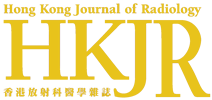Systemic Therapy for Advanced Gastric Cancer
W Yeo
Hong Kong J Radiol 2010;13(Suppl):S25-8
Gastric cancer is the fourth commonest cancer worldwide, with nearly a million new patients being diagnosed with this disease per year, of whom 55% are in East Asia. Regrettably, despite the availability of potentially curative resection, between 50 and 90% of these patients die as a result of disease relapse. This article discusses systemic therapy for advanced gastric cancer, with a focus on cytotoxic chemotherapy and targeted therapy for unresectable, metastatic or recurrent disease. Older-generation cytotoxics entailed 5-fluorouracil, the platinum compound cisplatin, and anthracyclines (doxorubicin and epirubicin). In this disease setting, clinical trials have addressed the role of palliative chemotherapy versus best supportive care, as well as single agent versus combination chemotherapy. New cytotoxic agents that have been tested include oral fluoropyrimidines (capecitabine and S-1), other platinum derivatives (oxaliplatin), taxanes (docetaxel and paclitaxel) and irinotecan. Outcomes associated with various treatment regimens incorporating these newer agents and old-generation combination chemotherapy have been compared. The main biological agents that have been tested include those that act on 3 classes of molecular targets, namely human epidermal growth factor receptor 2, vascular endothelial growth factor, and epidermal growth factor receptor.
中文摘要
進展期胃癌的全身性治療
楊明明
胃癌位居世界最常見癌症的第四位,每年都有接近一百萬名新診斷的胃癌病人,其中有55%在東亞 地區發生。可惜的是,縱使有可為胃癌作根治性的切除術,仍然有五至九成的病人因胃癌復發而死 亡。本文探討晚期胃癌的全身性治療,並集中討論對不能切除、轉移性或復發性胃癌的化療及標靶 治療。上一代的化療藥物有5-氟脲嘧啶、順鉑(鉑類合成藥物)及蒽環類抗癌藥物(阿霉素及表阿 霉素)。在這些病例中,許多臨床研究都嘗試比較緩解化療和最佳支持治療,以及比較單藥化療和 聯合化療。經測試的新一代化療藥物包括口服氟尿嘧啶類藥物(卡培他濱及S1),其他鉑類藥物 (奧沙利鉑),紫杉醇類藥物(多烯紫杉醇及紫杉醇)及伊立替康。並比較了由多種上一代藥物與 新一代藥物聯合化療進行的各種治療方案的效果。經測試的主要生物製劑包括了用於應對三種分子 標靶,它們分別為人類表皮生長因子受體-2、血管內皮生長因子、以及表皮生長因子受體。

